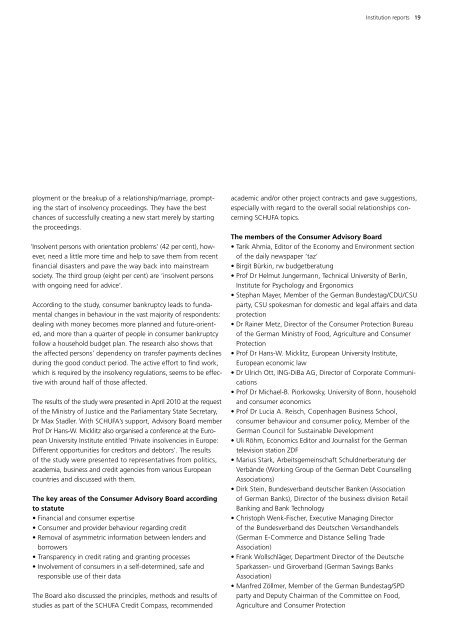2010 (PDF, 1.1 MB) - Schufa
2010 (PDF, 1.1 MB) - Schufa
2010 (PDF, 1.1 MB) - Schufa
You also want an ePaper? Increase the reach of your titles
YUMPU automatically turns print PDFs into web optimized ePapers that Google loves.
ployment or the breakup of a relationship/marriage, prompt-<br />
ing the start of insolvency proceedings. They have the best<br />
chances of successfully creating a new start merely by starting<br />
the proceedings.<br />
‘Insolvent persons with orientation problems’ (42 per cent), however,<br />
need a little more time and help to save them from recent<br />
financial disasters and pave the way back into mainstream<br />
society. The third group (eight per cent) are ‘insolvent persons<br />
with ongoing need for advice’.<br />
According to the study, consumer bankruptcy leads to fundamental<br />
changes in behaviour in the vast majority of respondents:<br />
dealing with money becomes more planned and future-oriented,<br />
and more than a quarter of people in consumer bankruptcy<br />
follow a household budget plan. The research also shows that<br />
the affected persons’ dependency on transfer payments declines<br />
during the good conduct period. The active effort to find work,<br />
which is required by the insolvency regulations, seems to be effective<br />
with around half of those affected.<br />
The results of the study were presented in April <strong>2010</strong> at the request<br />
of the Ministry of Justice and the Parliamentary State Secretary,<br />
Dr Max Stadler. With SCHUFA’s support, Advisory Board member<br />
Prof Dr Hans-W. Micklitz also organised a conference at the European<br />
University Institute entitled ‘Private insolvencies in Europe:<br />
Different opportunities for creditors and debtors’. The results<br />
of the study were presented to representatives from politics,<br />
academia, business and credit agencies from various European<br />
countries and discussed with them.<br />
The key areas of the Consumer Advisory Board according<br />
to statute<br />
• Financial and consumer expertise<br />
• Consumer and provider behaviour regarding credit<br />
• Removal of asymmetric information between lenders and<br />
borrowers<br />
• Transparency in credit rating and granting processes<br />
• Involvement of consumers in a self-determined, safe and<br />
responsible use of their data<br />
The Board also discussed the principles, methods and results of<br />
studies as part of the SCHUFA Credit Compass, recommended<br />
Institution reports 19<br />
academic and/or other project contracts and gave suggestions,<br />
especially with regard to the overall social relationships concerning<br />
SCHUFA topics.<br />
The members of the Consumer Advisory Board<br />
• Tarik Ahmia, Editor of the Economy and Environment section<br />
of the daily newspaper ‘taz’<br />
• Birgit Bürkin, rw budgetberatung<br />
• Prof Dr Helmut Jungermann, Technical University of Berlin,<br />
Institute for Psychology and Ergonomics<br />
• Stephan Mayer, Member of the German Bundestag/CDU/CSU<br />
party, CSU spokesman for domestic and legal affairs and data<br />
protection<br />
• Dr Rainer Metz, Director of the Consumer Protection Bureau<br />
of the German Ministry of Food, Agriculture and Consumer<br />
Protection<br />
• Prof Dr Hans-W. Micklitz, European University Institute,<br />
European economic law<br />
• Dr Ulrich Ott, ING-DiBa AG, Director of Corporate Communications<br />
• Prof Dr Michael-B. Piorkowsky, University of Bonn, household<br />
and consumer economics<br />
• Prof Dr Lucia A. Reisch, Copenhagen Business School,<br />
consumer behaviour and consumer policy, Member of the<br />
German Council for Sustainable Development<br />
• Uli Röhm, Economics Editor and Journalist for the German<br />
television station ZDF<br />
• Marius Stark, Arbeitsgemeinschaft Schuldnerberatung der<br />
Verbände (Working Group of the German Debt Counselling<br />
Associations)<br />
• Dirk Stein, Bundesverband deutscher Banken (Association<br />
of German Banks), Director of the business division Retail<br />
Banking and Bank Technology<br />
• Christoph Wenk-Fischer, Executive Managing Director<br />
of the Bundesverband des Deutschen Versandhandels<br />
(German E-Commerce and Distance Selling Trade<br />
Association)<br />
• Frank Wollschläger, Department Director of the Deutsche<br />
Sparkassen- und Giroverband (German Savings Banks<br />
Association)<br />
• Manfred Zöllmer, Member of the German Bundestag/SPD<br />
party and Deputy Chairman of the Committee on Food,<br />
Agriculture and Consumer Protection
















